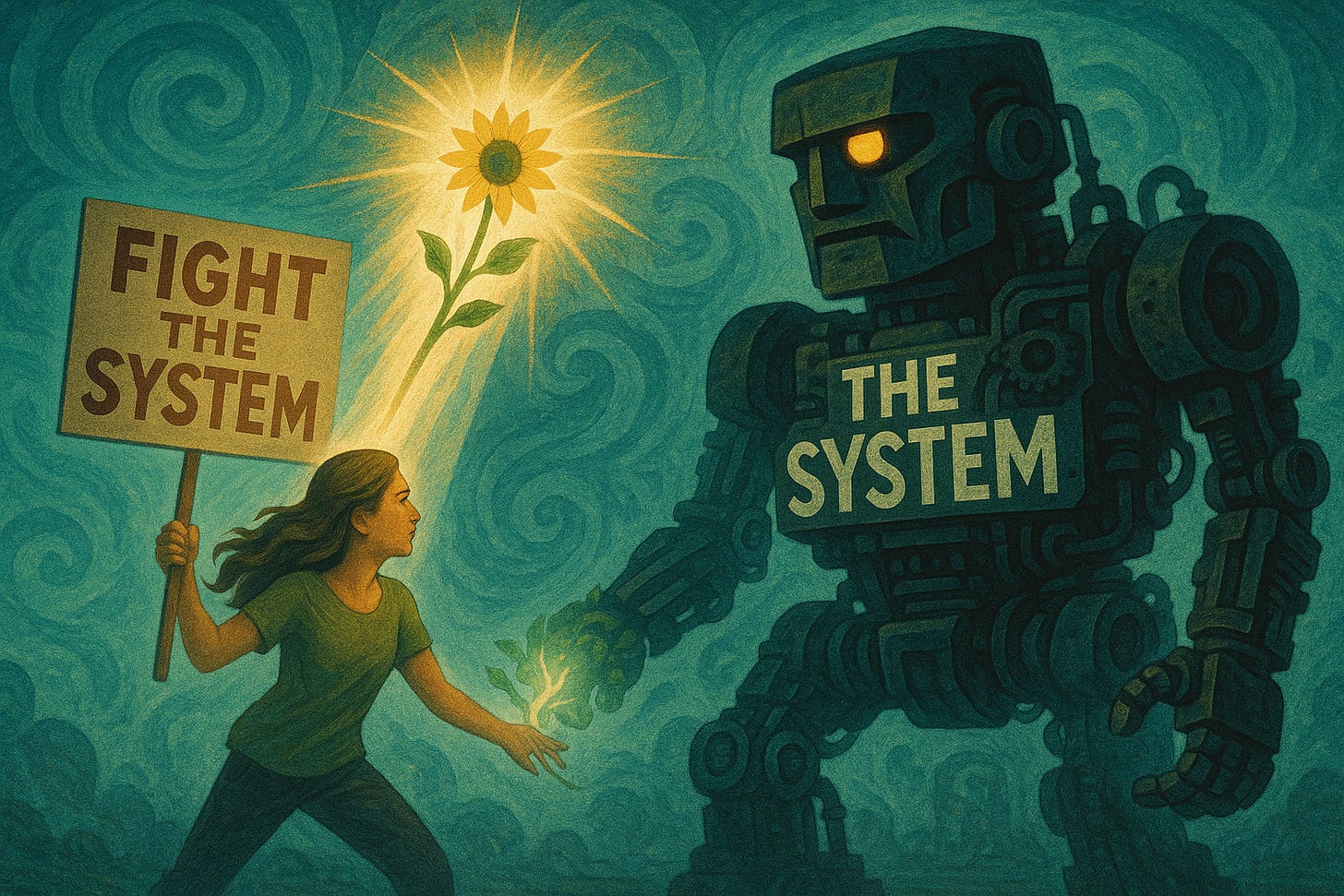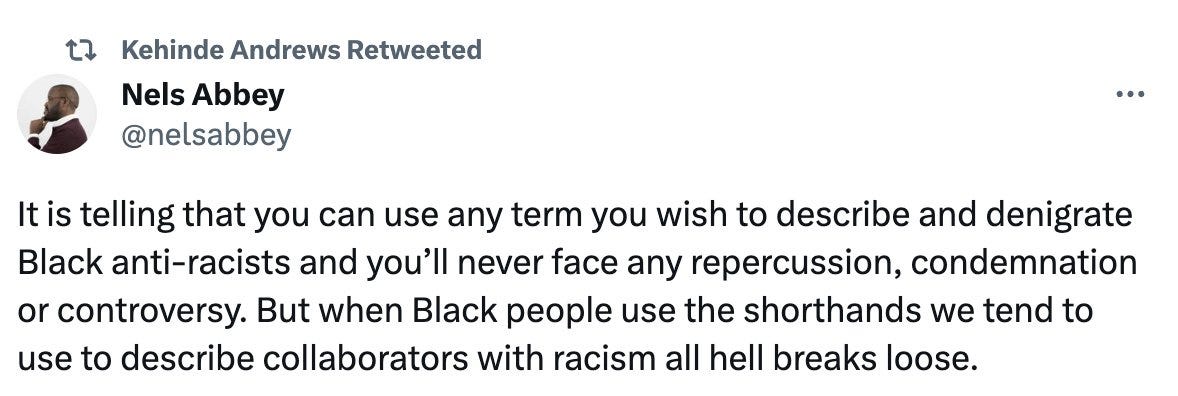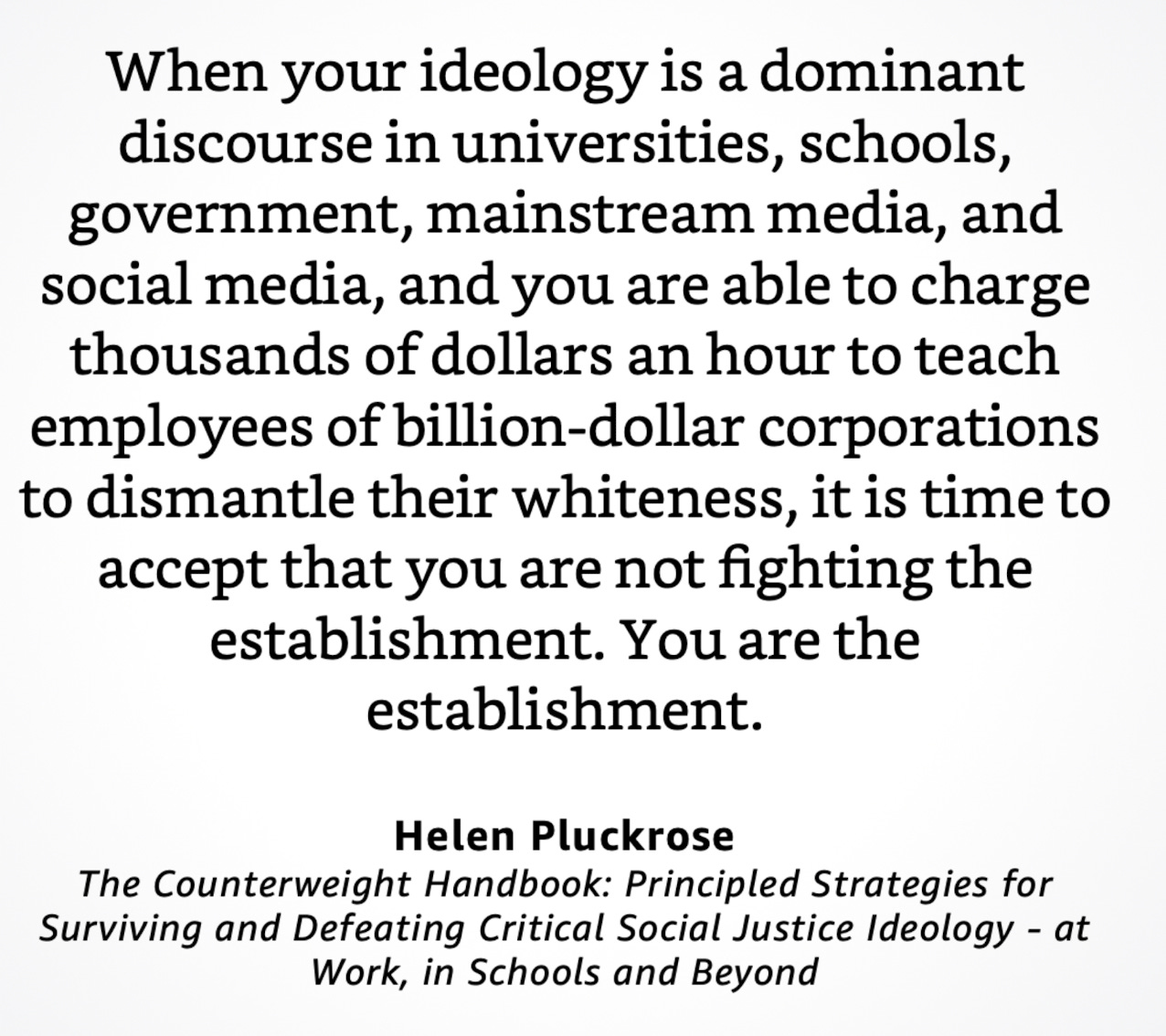The Status Quo is Always Other People
And how this justifies bad behaviour.
(Audio version here)
The Overflowings of a Liberal Brain has 5000 readers! We are creating a space for liberals who care about what is true on the left, right and centre to come together and talk about how to understand and navigate our current cultural moment with effectiveness and principled consistency.
I think it is important that I keep my writing free. It is paying subscribers who allow me to spend my time writing and keep that writing available to everyone. Currently 3.75% of my readers are paying subscribers. My goal for 2025 is to increase that to 7%. This will enable me to keep doing this full-time into 2026! If you can afford to become a paying subscriber and want to help me do that, thank you! Otherwise, please share!
It is common to see wildly conflicting claims about the nature of the ‘status quo’ in political statements online. Claims about what the currently dominant norms and expectations are seldom reveal an assumption that they align with the speaker’s own values. Rather, people commonly assert a status quo to exist in the form of something that is particularly hostile to them or contradictory to their own views. They do so while significantly underestimating the influence of their own views in mainstream discourse.
I first thought about writing about this phenomenon in 2023 when this post stood out to me as a particularly good example of this.
Abbey was responding to criticism of Kehinde Andrews referring to black people who disagreed with his Black Nationalist ideas as ‘House Negroes,” “Coons” and “Uncle Toms.” It was astonishing to many that he saw a society in which it was easy for people to criticise black “anti-racist” activists. At this time, most of my own circle - and my own work - was focused on the problem of ‘Cancel Culture’ in which people were getting fired and socially ostracised for doing anything which even suggested not unambiguously affirming “woke” anti-racist beliefs.
Of course, two things can be correct at the same time. People criticising ‘woke’ approaches to anti-racism really were being cancelled and penalised and Kehinde Andrews really was attracting strongly negative feedback for his use of ‘in-group’ racial slurs, including from me. However, they cannot both define the status quo. Reality is far messier than this. Abbey’s first sentence is straightforwardly and demonstrably false, while his second statement, if understood to refer to a sizeable negative reaction (no penalisation or cancellation), is true.
Similarly, those of the anti-woke who claimed that “wokeness” and particularly DiAngelo style “anti-racism” had outsized social influence and prestige and was being implemented in an authoritarian way were correct. However, when some of them claimed that it was impossible to challenge or criticise it in any way, they were not. A significant backlash was already growing and alternative media spaces and political organisations had sprung up to counter it. It certainly was near impossible to criticise wokeness in many mainstream institutions and platforms and this was a serious problem. However, the court of public opinion was deliberating on this issue and it was already beginning to look bad for the woke.
This matters, because, while we can claim that one movement had more power than the other - I think it was clearly the woke - they were both significant aspects of the status quo. By only seeing one of them which we perceive to utterly dominate society and political discourse in harmful ways - whether it is the ‘woke’ or ‘anti-woke’ - we risk not monitoring the ethics and influence of the other one. It is typically our own movement’s principles and behaviour we neglect to critique and hold to a high standard. This is due to a feeling of being a besieged underdog trying to speak truth to power. We might ask, “How can we do harm when they have all the power?” Even when the power imbalance is identified correctly, this attitude enables and even justifies ethical inconsistency, detachment from reality and authoritarian overreach.
Any movement or political group that bunkers down into its own ideological tribe and tunes into its own narratives and view of the world exclusively is inclined to become deeply unethical and also quite mad. We have the perfect example of this with the Critical Social Justice (woke) movement from which to learn. By feeding and building on its own narratives of the dominance of a white supremacist, patriarchal, imperialistic, cis/heteronormative status quo in an enclosed bubble, it entirely failed to acknowledge itself as an increasingly dominant part of the status quo. By positioning itself as a radical grassroots movement speaking truth to power, it failed to recognise its own power. By perceiving itself as being an enlightened collective who can see The Truth to which others are asleep (not woke), it was able to justify the authoritarian way it was imposing its own worldview on everyday people, especially the workers whose interests the left had always stood for. Because it needed those oppressive systems to exist to have relevance and purpose, it saw them everywhere and in everything and became increasingly unhinged and detached from reality.
Becoming detached from reality is bad. It is certainly bad for society when the movement has significant power and prestige, but it should be recognised as a problem even within smaller movements or political groups which do not have that power. It drives the formation of polarising group narratives while being counterproductive to the aim of achieving anything and convincing people who do not already agree with you.
Biased and blinkered perceptions of the status quo are expressed within a whole range of movements and ideological groups. They are frequently offered straightforwardly as an observation of one’s own experience, which can seem a little confusing when taken at face value.
For example, when someone says, “Everybody’s fine with attacking Christianity but Islam is totally off limits,” it would be reasonable to assume their social circle is either Muslim or woke progressive for this to be their perception. However, if you go into their account, you will nearly always find that they are Christian and/or conservative and so are their followers, and their account is full of people being positive about Christianity and negative about Islam. “Everybody” is clearly ‘everybody else.”
Similarly, when someone says that “People are always bashing Islam and Muslims, but Christianity and Christians can do no wrong” you might think that individual is part of an anti-Muslim Christian community. On closer examination, one is almost certain to find they belong to a group of progressive activists who criticise Christianity a great deal and are very positive about Islam. “People” are “other people.”
Neither claimant is referring to the attitudes of the people surrounding them but to attitudes they perceive to dominate society which are contrary to their own. They frequently do so in a blanket way referring to a perceived powerful status quo they are uniquely equipped to see and dedicated to fighting. Both of them fail to see themselves as part of that status quo. This drives polarisation, of course, and hinders productive conversation. This is a problem because precision in making such assertions would be useful for addressing the genuine and demonstrable problems each of them see.
Surveys indicate that way more Britons feel negatively about Islam compared to Christianity, suggesting that Muslim activists and progressives are pointing to something real. Surveys also show that more people feel confident to criticise Christianity than Islam, suggesting that Christians and conservatives are identifying a genuine problem too. Their concerns are not, in fact, contradictory. This is significant, and more open, honest and evidence-based discussion of why this is the case, ideally with each other, would be very useful. We need to have those open conversations about what needs to be done to ensure that people do feel able to criticise Islam and express their concerns about its values and influence. We also need to have such conversations about how to ensure that Muslim Britons about whom no negative assumptions are warranted are not treated as though they are.
When somebody says something like, “Women are constantly being told they exist to have children and take on domestic roles” you might think they are in a very socially conservative bubble to receive such messaging, but this generally indicates that they are in a feminist bubble within which nobody holds such views. Similarly, when someone says, “Women are being made to believe that motherhood is oppressive” you could reasonably assume they were in a fringe, radical feminist bubble where this is a dominant narrative, but they are typically in a socially conservative bubble, where motherhood is regarded very positively.
Again, the makers of both kinds of claim perceive themselves to be fighting against a harmful status quo formed of everybody else and which harms women. Neither of them seem to think their own views on the matter are part of the status quo while both of them are convinced that the other’s view, in fact, dominates. In reality, 36% of people say society pressures women to have children while 40% believe it does not. There is no consensus on the issue. However, 90% of women regard motherhood positively, so claims of culture-wide social conditioning by feminists to believe otherwise are not upheld by evidence.
Accurate perception of reality is important here too. On a personal level, I find myself frequently infuriated by both feminist and anti-feminist claims about the impacts of cultural conditioning on women. I’d suggest it is quite possible, and indeed desirable, to discuss social pressures on women in relation to parenting and gender roles without assuming women, in particular, to be especially prone to becoming the passive victims of ideological brainwashing. My own observation is that few women consider ideological arguments when making decisions about whether or not to have children, but instead decide based on their own individual desire (or not) to be a mother and their material conditions. It is also easy for women who want to make motherhood their primary role in life to find social circles of women who have also made this choice and access positive media representation of this lifestyle. There are likewise many opportunities for women who decide to remain childless to simply form supportive social networks with other women who share their professional, intellectual or personal interests, and there is much positive media representation of the childless lifestyle too. (Honestly, we’re fine).
It would be much more useful for social conservatives who wish to make it easier for women to have children - especially those concerned about declining birth rates - to consider practical and material issues like affordable housing, parental leave, flexible working hours and policies for minimising the impact of career interruption on mothers. Similarly, those concerned that women may feel pressured into having children they do not want would likely do best to provide resources and support for women in religious or socially conservative subcultures who might find it more difficult to resist this pressure than those of us who move in the mainstream culture.
I am not, of course, suggesting that we should not identify aspects of the status quo which most concern us, draw attention to them and argue against them. This is not only entirely natural but also necessary if we want to effect positive change. I have dedicated my life full-time to doing precisely this. Nor do I suggest that we “both-sides” everything, take on a false neutrality and decline to identify anything as having excessive power and prestige in society or create false equivalences. I do not, for example, write essays about the ways in which society is upholding liberalism well. I write about the ways in which it is not, and I have focused much of my attention on the problems with the Critical Social Justice movement. This often leads people on the right to be surprised or even feel disillusioned when I address illiberalism arising on the right, particularly recently with the rise of the ‘post-truth’ populist right and the growing illiberalism among elements of the ‘anti-woke.’
This is precisely why I think it’s so important to actively guard against ideological blinkers and biased perceptions of the status quo, particularly the tendency to view it as entirely dominated by one’s political opponents.
I am concerned that the status quo is becoming increasingly illiberal and it would be demonstrably false to perceive this as entirely the work of the woke. I am very aware of elements of the anti-woke who consider themselves liberal and who have, indeed, argued well and consistently for liberal principles, but have now become blinkered and seem to be entirely blind to illiberalism among the anti-woke and the threat from the populist right.
These are often the people who, when I criticise right-wing illiberalism, indignantly redirect me back to the left as if only one form of illiberalism can exist at a time, as if I haven’t spent over a decade critiquing the illiberal left, and as if that’s not precisely why they followed me in the first place. This kind of tunnel vision, where the biggest threat becomes all that we see, is deeply concerning and results in a failure to monitor our own ethical consistency and recognise the influence we hold and use it effectively.
If you want to stay grounded in reality and maintain your ethical consistency, it’s essential - for both individuals and movements - to hold a realistic view of the status quo. Recognise your own place within it, and the influence and power your stance already carries. Acknowledge that social reality is messy and rarely aligns neatly with ideological narratives. Address the material facts of any issue precisely. Turn your gaze away from the ‘enemy’ from time to time, and scrutinise the principles and behaviour of your own side.
Resist, at all costs, the temptation to believe that because the other side holds the power, you are exempt from holding yourself to high standards of truth and principle. Otherwise, if your worldview eventually wins out - and surely that is the aim?- you risk having helped usher in a new dominant orthodoxy that is no more principled or grounded in reality than the one you set out to replace.





Well, what can I say? Another excellent, rational, principled essay. Have restacked several excerpts.
"the people who, when I criticise right-wing illiberalism, indignantly redirect me back to the left as if only one form of illiberalism can exist at a time, as if I haven’t spent over a decade critiquing the illiberal left, and as if that’s not precisely why they followed me in the first place." - You are the best, Helen! Love it! Keep telling'em like it is!